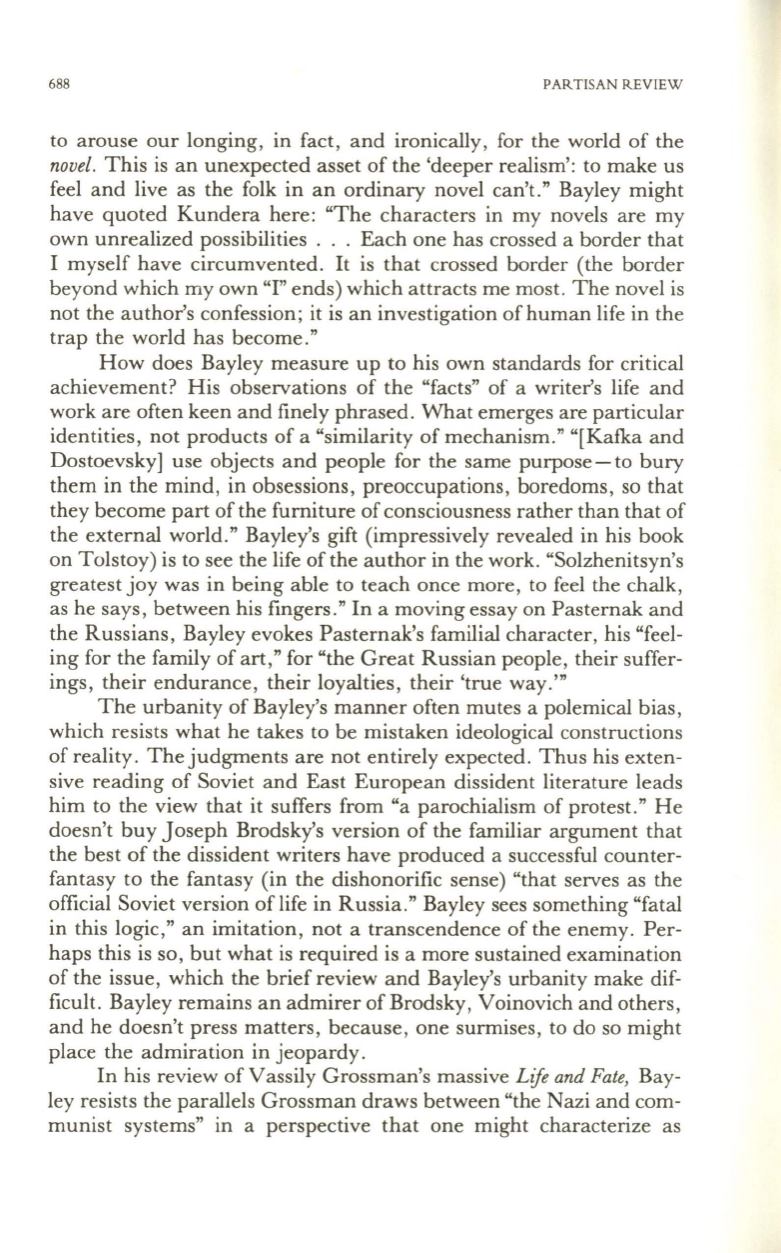
688
PARTISAN REVIEW
to arouse our longing, in fact, and ironically, for the world of the
novel.
This is an unexpected asset of the 'deeper realism': to make us
feel and live as the folk in an ordinary novel can't." Bayley might
have quoted Kundera here: "The characters in my novels are my
own unrealized possibilities . . . Each one has crossed a border that
I myself have circumvented .
It
is that crossed border (the border
beyond which my own "I" ends) which attracts me most. The novel is
not the author's confession; it is an investigation of human life in the
trap the world has become."
How does Bayley measure up to his own standards for critical
achievement? His observations of the "facts" of a writer's life and
work are often keen and finely phrased. What emerges are particular
identities, not products of a "similarity of mechanism." "[Kafka and
Dostoevsky
1
use objects and people for the same purpose - to bury
them in the mind, in obsessions, preoccupations, boredoms, so that
they become part of the furniture of consciousness rather than that of
the external world." Bayley's gift (impressively revealed in his book
on Tolstoy) is to see the life of the author in the work . "Solzhenitsyn's
greatest joy was in being able to teach once more, to feel the chalk,
as he says, between his fingers." In a moving essay on Pasternak and
the Russians, Bayley evokes Pasternak's familial character, his "feel–
ing for the family of art," for "the Great Russian people, their suffer–
ings, their endurance, their loyalties, their 'true way.'"
The urbanity of Bayley's manner often mutes a polemical bias,
which resists what he takes to be mistaken ideological constructions
of reality. The judgments are not entirely expected. Thus his exten–
sive reading of Soviet and East European dissident literature leads
him to the view that it suffers from "a parochialism of protest." He
doesn't buy Joseph Brodsky's version of the familiar argument that
the best of the dissident writers have produced a successful counter–
fantasy to the fantasy (in the dishonorific sense) "that serves as the
official Soviet version of life in Russia." Bayley sees something "fatal
in this logic," an imitation, not a transcendence of the enemy. Per–
haps this is so, but what is required is a more sustained examination
of the issue, which the brief review and Bayley's urbanity make dif–
ficult. Bayley remains an admirer of Brodsky, Voinovich and others,
and he doesn't press matters, because, one surmises, to do so might
place the admiration in jeopardy.
In his review of Vassily Grossman's massive
Life and Fate,
Bay–
ley resists the parallels Grossman draws between "the Nazi and com–
munist systems" in a perspective that one might characterize as


